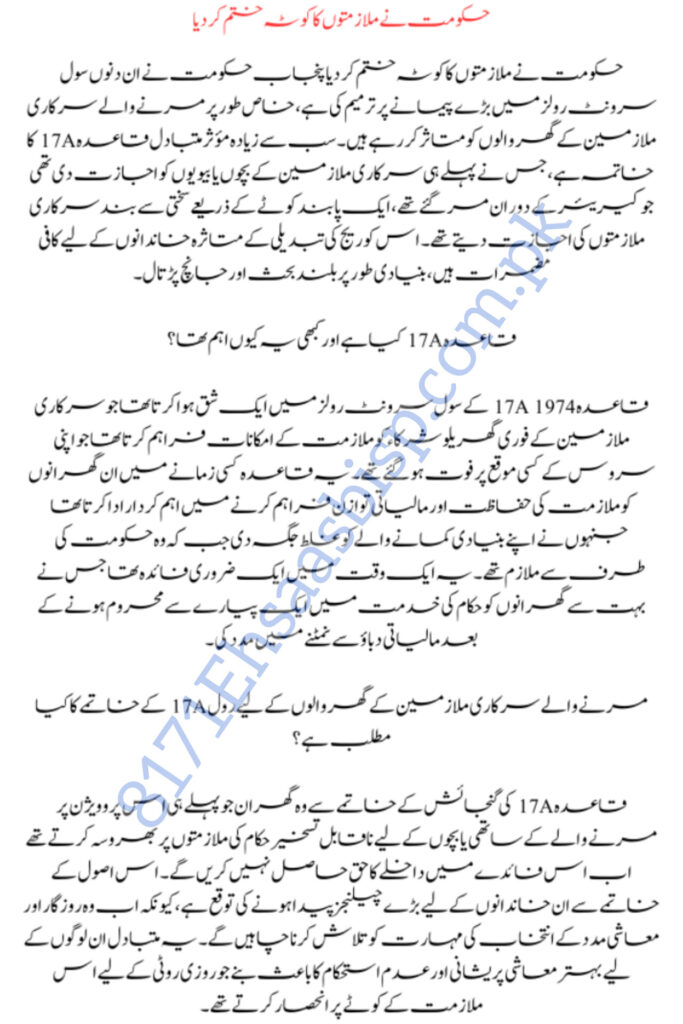
Introduction
In a significant policy revision, the Punjab Government has recently amended the Civil Servant Rules, notably impacting the families of deceased civil servants. The most profound change is the abolition of Rule 17A, which previously allowed the children or spouses of civil servants who passed away during service to secure government jobs through a dedicated quota. This policy shift has far-reaching implications for the affected families, sparking extensive debate and scrutiny.
Understanding Rule 17A
Rule 17A was a provision in the Civil Servant Rules of 1974 that provided job opportunities to the immediate family members of civil servants who died while in service. This rule was instrumental in offering job security and financial stability to families who lost their primary breadwinner while they were employed by the government. It served as a crucial benefit that helped many families cope with the financial strain following the loss of a loved one in government service.
Impact of Abolishing Rule 17A
Financial and Employment Challenges
The removal of Rule 17A means that families who previously relied on this provision to secure government jobs for the deceased’s spouse or children will no longer have access to this benefit. This change is expected to create significant challenges for these families, as they will now need to find alternative means of employment and financial support. The abolition could lead to increased financial hardship and instability for those who depended on this job quota for their livelihood.
Employment Prospects
With the elimination of Rule 17A, the immediate family members of deceased civil servants will no longer have preferential access to government jobs under the service quota. This shift is likely to make it more difficult for these individuals to secure employment within the government sector, which was previously a source of stability and support. The competitive nature of job markets, coupled with the absence of this quota, could mean that affected family members will face more substantial challenges in finding suitable employment.

Reasons Behind the Policy Shift
The Punjab Government’s decision to abolish Rule 17A marks a significant policy shift, though the specific reasons behind this change have not been publicly detailed. Such changes are often driven by various factors, including fiscal constraints, administrative reforms, or shifts in policy priorities. While the exact motivations behind the abolition of Rule 17A are not explicitly clear, the change reflects a broader re-evaluation of employment benefits and government policies related to civil servants and their families.
- see Also:
- Breaking News: How to Apply for the Agriculture Internship Program: A Detailed Guide 2024
- Exclusive Updates: Punjab Government Announces Major Recruitment Drive for 30,000 Teachers 2024
- Breaking News: Sindh Textbook Board Launches Ambitious Tablet Distribution Initiative for Students 2024
- ASF Jobs Apply Before August 25, 2024 – Complete Guide
- Exclusive News: Huawei Train the Trainer Program: A Groundbreaking Initiative for Pakistani Students in 2024
Potential Implications
Debates and Discussions
The implications of abolishing Rule 17A are multifaceted. On one hand, the removal of this rule could lead to increased debate about the support systems in place for the families of deceased government employees. It raises questions about how the government can balance budgetary constraints with the need to provide adequate support to families who have suffered a loss. On the other hand, this policy shift may prompt discussions on alternative ways to offer support or compensation to these families, potentially leading to new measures or reforms in the future.
Conclusion
The abolition of Rule 17A represents a significant policy change by the Punjab Government, with extensive consequences for the families of deceased civil servants. This modification removes a critical benefit that provided job security and financial stability to those who had lost a loved one in government service. The change is expected to create substantial challenges for these families as they adjust to the new employment landscape and seek alternative means of support. The policy shift underscores the need for ongoing dialogue and evaluation regarding the support systems available to families affected by the loss of a civil servant.
